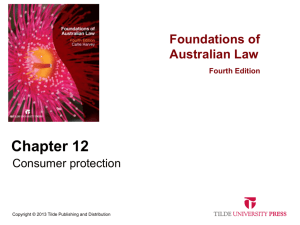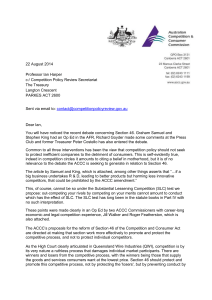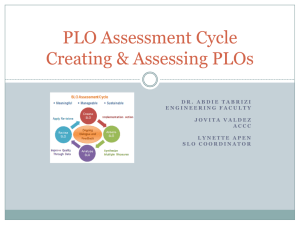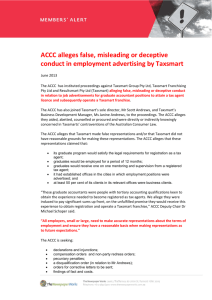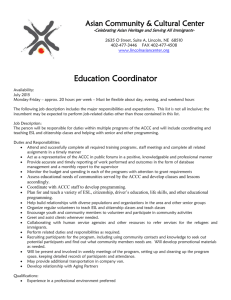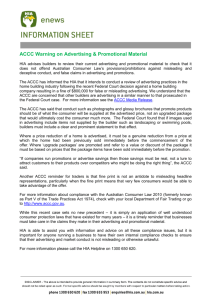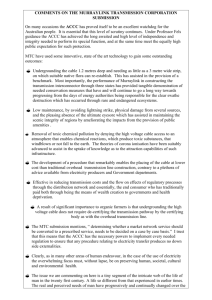Federal Court Cracks Down on Fowl Play
advertisement
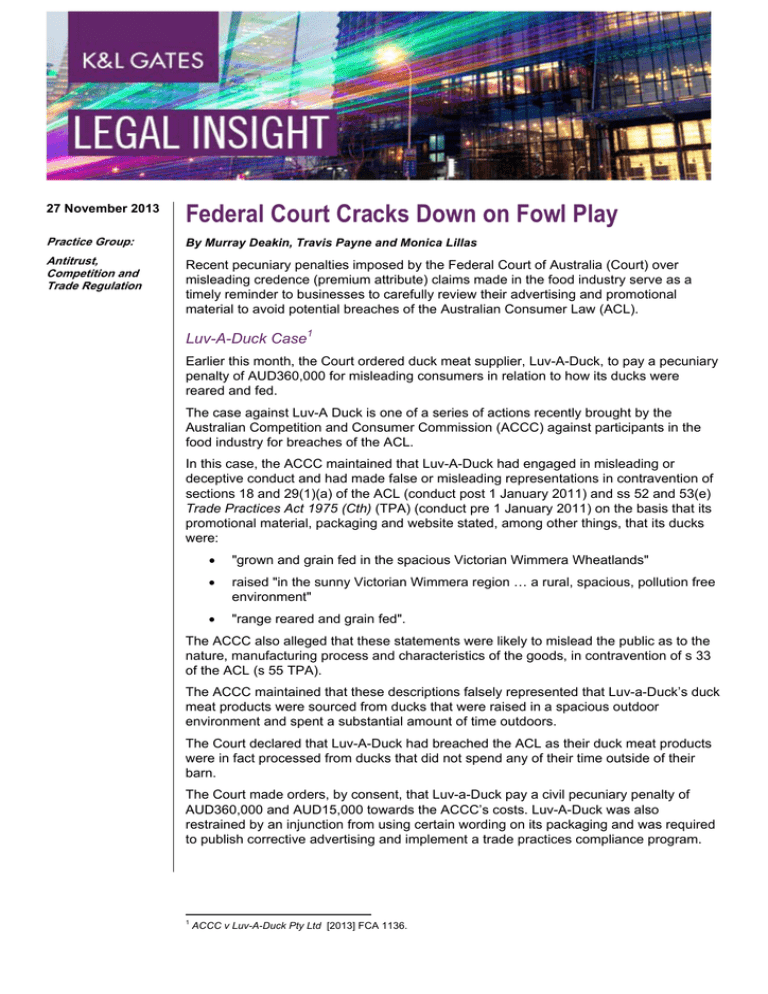
27 November 2013 Federal Court Cracks Down on Fowl Play Practice Group: By Murray Deakin, Travis Payne and Monica Lillas Antitrust, Competition and Trade Regulation Recent pecuniary penalties imposed by the Federal Court of Australia (Court) over misleading credence (premium attribute) claims made in the food industry serve as a timely reminder to businesses to carefully review their advertising and promotional material to avoid potential breaches of the Australian Consumer Law (ACL). Luv-A-Duck Case1 Earlier this month, the Court ordered duck meat supplier, Luv-A-Duck, to pay a pecuniary penalty of AUD360,000 for misleading consumers in relation to how its ducks were reared and fed. The case against Luv-A Duck is one of a series of actions recently brought by the Australian Competition and Consumer Commission (ACCC) against participants in the food industry for breaches of the ACL. In this case, the ACCC maintained that Luv-A-Duck had engaged in misleading or deceptive conduct and had made false or misleading representations in contravention of sections 18 and 29(1)(a) of the ACL (conduct post 1 January 2011) and ss 52 and 53(e) Trade Practices Act 1975 (Cth) (TPA) (conduct pre 1 January 2011) on the basis that its promotional material, packaging and website stated, among other things, that its ducks were: "grown and grain fed in the spacious Victorian Wimmera Wheatlands" raised "in the sunny Victorian Wimmera region … a rural, spacious, pollution free environment" "range reared and grain fed". The ACCC also alleged that these statements were likely to mislead the public as to the nature, manufacturing process and characteristics of the goods, in contravention of s 33 of the ACL (s 55 TPA). The ACCC maintained that these descriptions falsely represented that Luv-a-Duck’s duck meat products were sourced from ducks that were raised in a spacious outdoor environment and spent a substantial amount of time outdoors. The Court declared that Luv-A-Duck had breached the ACL as their duck meat products were in fact processed from ducks that did not spend any of their time outside of their barn. The Court made orders, by consent, that Luv-a-Duck pay a civil pecuniary penalty of AUD360,000 and AUD15,000 towards the ACCC’s costs. Luv-A-Duck was also restrained by an injunction from using certain wording on its packaging and was required to publish corrective advertising and implement a trade practices compliance program. 1 ACCC v Luv-A-Duck Pty Ltd [2013] FCA 1136. Federal Court Cracks Down on Fowl Play Pepe's Ducks Case2 In June 2013, the ACCC brought a claim against Pepe's Ducks Ltd (Pepe's Ducks) alleging similar breaches of the ACL for the use of the words "open range" and "grown nature's way" on the company's packaging, website, delivery vehicles, signage and merchandise. These phrases were often used in conjunction with a picture of a duck in the outdoors walking on grass against a background of a lake with hills behind. Pepe's Ducks admitted that its ducks were, in fact, raised in barns and never allowed outside and that their conduct was false, misleading and deceptive to consumers. The company was ordered to pay AUD400,000, comprising a AUD375,000 pecuniary penalty and a AUD25,000 contribution to the ACCC's costs. In the judgment, Justice Blomburn highlighted the need to ensure that the penalty was "sufficiently large to be an effective deterrent".3 The Court also made orders restraining Pepe's Ducks from using the contravening phrases for a period of three years, requiring the company to implement a trade practices compliances program and provide corrective notices to its customers and to also publish the notices on its website and business premises. In speaking about the Pepe's Ducks decision, ACCC Commissioner Sarah Court stated that "consumers must be able to trust what is on the label is true and accurate", advising that the penalty was "a warning to businesses to make sure they are not misleading consumers into paying a premium for products that don’t match the claims made on the label”.4 ACCC Priorities These decisions illustrate a growing trend of the ACCC seeking and obtaining significant pecuniary penalties for contraventions of the ACL. Earlier this year, Turi Foods Pty Ltd, processor and supplier of La Ionica branded chicken products, was ordered to pay AUD100,000 for inaccurate representations that their products were "free range"5.Last month, the Federal Court made a pecuniary penalty award of AUD400,000 for similar "free to roam" claims.6 In an address to the Australian Food and Grocery Council Industry Leaders Forum in Canberra on 30 October 2013, ACCC Chairman, Rod Sims, emphasized that credence claims were an ongoing priority for the ACCC due to their potential to have a significant effect on consumers and the competitive process.7 2 ACCC v Pepe's Ducks Ltd [2013 ] FCA 570. ACCC v Pepe's Ducks Ltd [2013 ] FCA 570 at [18]. 4 ACCC Press Release, "Court orders Luv-a-Duck to pay $360,000 for misleading claims", 1 November 2013. 5 ACCC v Turi Foods Pty Ltd (No 2) [2012] FCA 19. 6 ACCC v Turi Foods Pty Ltd (No. 5) [2013] FCA 1109. 7 Mr Rod Sims' address to the Australian Food and Grocery Council Industry Leaders Forum, "Thoughts on market concentration" Canberra, 30 October 2013. 3 2 Federal Court Cracks Down on Fowl Play The ACCC is demonstrating a willingness to pursue claims in this space, having recently brought proceedings against Coles Supermarkets in the Federal Court concerning its promotion of certain bread products as "fresh baked".8 Implications for Business The ACCC has identified credence claims as an enforcement priority, particularly in the food industry. Businesses that fall foul of this area of the ACL may be exposed to penalties of up to AUD1.2 million. Given the ACCC's enforcement focus and the potential exposure to penalties, businesses need to be vigilant in their review of promotional and advertising material, particularly if any credence claims are being made. Businesses should therefore take steps to ensure that they: carefully review all advertising and promotional material containing credence claims before publication put in place appropriate 'sanity checks' of that material, with the assistance of external lawyers where necessary ensure staff who are involved in preparation and/or approval of advertising and marketing material receive appropriate trade practices compliance training. Authors: Murray Deakin murray.deakin@klgates.com +61.2.9513.2335 Travis Payne travis.payne@klgates.com +61.3.9640.4363 Monica Lillas monica.lillas@klgates.com +61.3.9640.4264 8 ACCC Press Release, "ACCC institutes proceedings against Coles for alleged false, misleading and deceptive bakery claims", 12 June 2013. 3 Federal Court Cracks Down on Fowl Play Anchorage Austin Beijing Berlin Boston Brisbane Brussels Charleston Charlotte Chicago Dallas Doha Dubai Fort Worth Frankfurt Harrisburg Hong Kong Houston London Los Angeles Melbourne Miami Milan Moscow Newark New York Orange County Palo Alto Paris Perth Pittsburgh Portland Raleigh Research Triangle Park San Diego San Francisco São Paulo Seattle Seoul Shanghai Singapore Spokane Sydney Taipei Tokyo Warsaw Washington, D.C. Wilmington K&L Gates practices out of 48 fully integrated offices located in the United States, Asia, Australia, Europe, the Middle East and South America and represents leading global corporations, growth and middle-market companies, capital markets participants and entrepreneurs in every major industry group as well as public sector entities, educational institutions, philanthropic organizations and individuals. For more information about K&L Gates or its locations, practices and registrations, visit www.klgates.com. This publication is for informational purposes and does not contain or convey legal advice. The information herein should not be used or relied upon in regard to any particular facts or circumstances without first consulting a lawyer. ©2013 K&L Gates LLP. All Rights Reserved. 4
